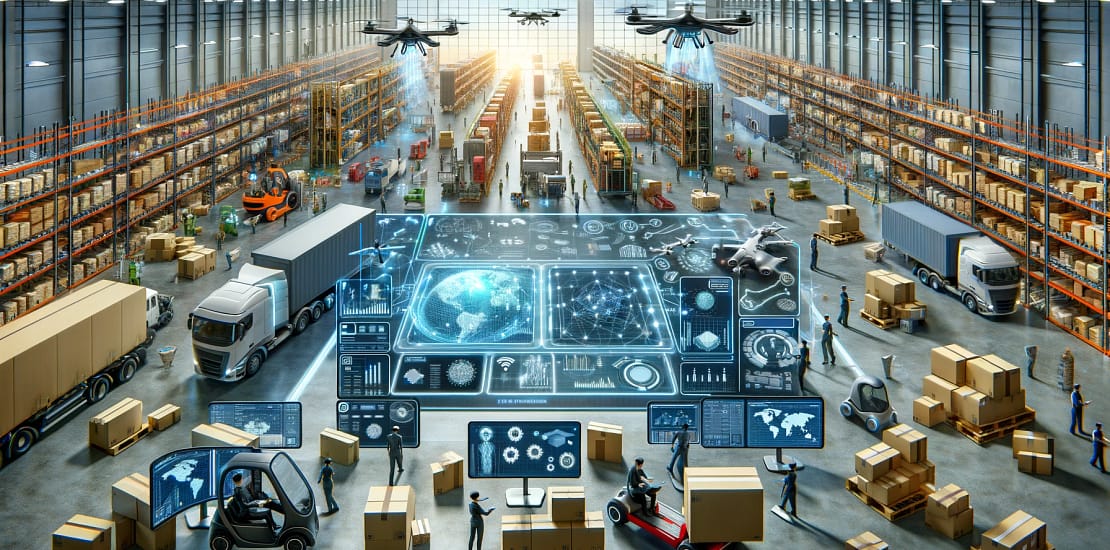Navigating the Future: AI’s Transformative Role in Logistics and Supply Chain Management
- December 15, 2023
- Posted by: Cheryl Li
- Category: Case Studies

In the intricate web of global commerce, logistics and supply chain management stand as critical pillars, ensuring the seamless flow of goods from manufacturers to consumers. However, this sector is not without its challenges, ranging from demand fluctuations and inventory management to transportation inefficiencies and last-mile delivery complexities. Enter Artificial Intelligence (AI), a game-changing force poised to revolutionize logistics and supply chain management by introducing unprecedented levels of efficiency, predictability, and agility. This blog post delves into the transformative impact of AI in this sector, highlighting how businesses are leveraging AI to streamline operations, reduce costs, and enhance customer satisfaction.
AI: The New Backbone of Logistics
AI’s role in logistics extends far beyond mere automation. It encompasses advanced analytics, machine learning algorithms, and intelligent automation, collectively enhancing decision-making and operational efficiency. From predictive analytics that forecast demand to autonomous vehicles that reshape delivery networks, AI is redefining the logistics landscape.
Optimizing Route Planning and Fleet Management
One of the most significant applications of AI in logistics is in route planning and fleet management. AI algorithms analyze vast amounts of data, including traffic patterns, weather conditions, and vehicle health, to determine the most efficient routes. This optimization reduces fuel consumption, decreases delivery times, and minimizes environmental impact, leading to cost savings and improved customer service.
Enhancing Inventory Management

AI-driven inventory management systems are revolutionizing how businesses manage their stock. By accurately predicting demand using historical sales data, market trends, and even social media sentiment, these systems help maintain optimal inventory levels, reducing the risk of overstocking or stockouts. This precision in inventory management ensures that businesses can meet customer demand without tying up unnecessary capital in inventory.
Streamlining Warehouse Operations
Warehouses are the nerve centers of logistics, and AI is making them smarter. Automated guided vehicles (AGVs) and drones, powered by AI, are optimizing warehouse operations, from stocking shelves to picking and packing orders. AI systems also manage and allocate tasks based on real-time demand and worker availability, enhancing productivity and reducing order processing times.
Improving Demand Forecasting
Precise prediction of demand is essential for effective management of the supply chain. AI leverages machine learning models to analyze complex patterns and trends, offering far more accurate demand forecasts than traditional methods. These insights enable businesses to adjust their production schedules, manage inventory more effectively, and plan logistics operations to meet anticipated demand, reducing waste and increasing efficiency.
Revolutionizing Last-Mile Delivery
Last-mile delivery, the final step in the delivery process, is often the most challenging and costly. AI is tackling this challenge head-on, with solutions ranging from dynamic delivery scheduling to autonomous delivery vehicles. By optimizing delivery routes and schedules in real-time, AI minimizes delays and ensures that customers receive their packages as efficiently as possible.
Enhancing Supply Chain Visibility
AI contributes to unprecedented transparency in supply chain operations. IoT (Internet of Things) devices and sensors, combined with AI analytics, provide real-time visibility into the movement of goods, from production to delivery. This visibility allows businesses to monitor their supply chain’s performance closely, anticipate potential disruptions, and take proactive measures to mitigate risks.
Mitigate Risks and Manage Disruptions
Supply chains are vulnerable to various risks, including natural disasters, geopolitical tensions, and market fluctuations. AI’s predictive capabilities help identify potential disruptions before they occur, allowing businesses to devise contingency plans. Moreover, AI-driven simulation models can assess the impact of different risk scenarios, enabling more robust risk management strategies.
Personalized Customer Experiences

In today’s market, personalized customer experiences can be a significant differentiator. AI in logistics allows for customized delivery options, real-time shipment tracking, and automated customer service interactions, elevating the customer experience and fostering loyalty.
Sustainable and Green Logistics
Sustainability is increasingly becoming a priority in logistics, and AI is at the forefront of green initiatives. From optimizing routes to reduce carbon emissions to managing reverse logistics for recycling and returns, AI is helping businesses achieve their sustainability goals while maintaining efficiency and profitability.
Overcoming Challenges and Embracing AI
While the potential of AI in logistics and supply chain management is vast, its adoption is not without challenges. Concerns regarding data privacy, the need for significant investments in technology and infrastructure, and the skills gap in AI and data analytics are notable hurdles. However, businesses that embrace AI, invest in talent development, and foster a culture of innovation are well-positioned to overcome these challenges and reap the benefits of AI-driven logistics.
The Road Ahead
The integration of AI into logistics and supply chain management is just beginning. As technology advances, we can expect more sophisticated AI applications, from more advanced autonomous vehicles to AI-driven global supply chain networks. The businesses that succeed in this new landscape will be those that view AI not as a tool but as a strategic partner in their logistics and supply chain operations.
Conclusion
AI’s role in transforming logistics and supply chain management cannot be overstated. By enhancing efficiency, reducing costs, and improving customer satisfaction, AI is not just changing how businesses manage their logistics and supply chains; it’s redefining the very paradigms of global commerce. As we move forward, the continued adoption and integration of AI in this sector will undoubtedly unlock new levels of innovation, resilience, and growth, marking a new era in the world of logistics and supply chain management.

